Help us understand. You with your full army you were to lead against Ramsay, how could you be without a mere command?

That’s right, we’re back in the thick of the Winterhell 2.0 plotline, this time with no Stannis. When we last left off, Julie, the combined forces of Kylie and Julia, entertained you for ten thousand words with a ~high level recap~ of the events. The biggest takeaways? Jonny Snow, in many ways the protagonist of this show (at least according to the marketing), is a fucking idiot who marched a significantly smaller army face-first into a wall of Boltons because there might have been snow in the extended forecast. Maybe.
His sister, The Sansa Stark Construct, luckily bailed him out of this, but he was made king. For…reasons.
Sansa is worthy of her own analysis, so that’s what we cover in Part 3. But for this installment, Julie is going to roll up her sleeves and examine Jonny Snow.

Our larger purpose with the retrospective series is to take each main character and plotline in isolation, so that we can hone in on the story showrunners David Benioff and Dan Weiss, along with their team of writers (all under the monolithic “D&D”) have given us, and understand the full implications of that story. Where there is meaning to be found, we attempt to explain it. But this is as rare as positive female interaction on the show. So bear with us.
Jonsicle Football
It may be hard to remember after watching/reading the full events, but the season began at The Wall with a dead Jonny. And the thing is, we’re almost inclined to just ignore this entirely, since the narrative sure as hell did.
But at the same time, this is a dude who was resurrected from the dead. With a mission to fight the army of the dead. You would have thought this would have played in a little more prominently to his characterization.
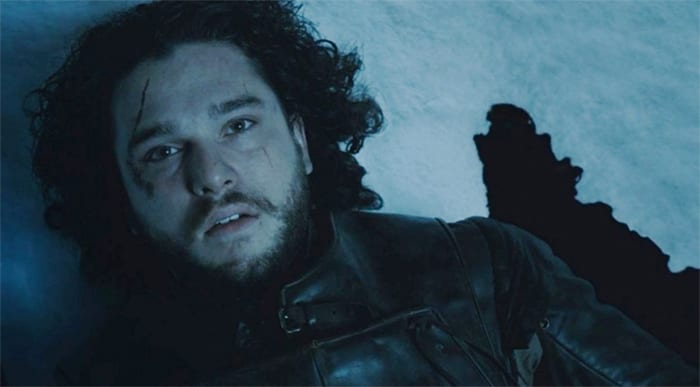
In terms of Jon’s behavior, there’s officially three scenes where it was addressed at all. The first is immediately afterwards, when everyone is reacting to him waking up. That seems totally reasonable, since we’re pretty sure all of us would react to such an event. Props again to Edd for being the only one to at least mention wights in this context.
“Your eyes are still brown. Is that still you in there?”
Yeah, good point, buddy.
The second scene is when Jon rage-quits his Lord Commander position, and Edd asks him for reasons why. Jon doesn’t outright mention death changing him, or anything of that nature, but does cite his brothers stabbing him as being the motivation for leaving. In our opinion, a failed assassination attempt could have accomplished the exact same thing, right down to hanging the four people he held responsible for it. His feelings still would have been hurt.
The third scene is where Jon asks Mel not to resurrect him if things go poorly. He doesn’t explain why, so we have to guess that this is weighing on him. Except that again, it doesn’t affect his actions in any way. This isn’t made better by the fact that Mel doesn’t really give him an option here, so the scene amounts to little more than D&D using these two characters to take pot-shots at the concept of a god. Again, nothing that couldn’t have been accomplished had Jon not died last season, since Mel would still be having a crisis of faith over how everything with Stannis played out.
Other than that, though characters on occasion mention Jon having been dead (Brienne says it’s natural for him to be so brooding considering, Tormund brings up him dying as a sacrifice to the other Wildlings, etc.), this just isn’t explored at all from Jon’s point of view. Nor is his character different in any discernible way than how he’s seemed from the start. If anything, he’s a little more likely to crack a joke, at least with Sansa. Did death give him a sense of humor?
If we’re being very, very generous, Jon needed to die as a loophole out of his Night’s Watch vows. After all, “Night gathers, and now my watch begins. It shall not end until my death.” This is a show that’s really fond of Night’s Watch vow loopholes, even having Sam discuss the sex loophole as recently as last season. And yeah, we guess dying *technically* released him. Though why the Jon we thought we knew as a character would want to be so dismissive of them given the stakes with the “Great War” is beyond us.
The death-as-a-loophole has two more problems attached to it: 1.) It was never explicitly mentioned in the show. By anyone. Julia was actually convinced it was, because it had to have been, right? Why else would people just be totally fine with this guy shirking his elected duties? But no, we checked. 2.) Jon still executed four men using the authority of the Lord Commander’s office after coming back. So…he just wanted to withhold that he no longer considered himself Lord Commander until after he exacted his revenge? Because that’s almost how it’s framed.
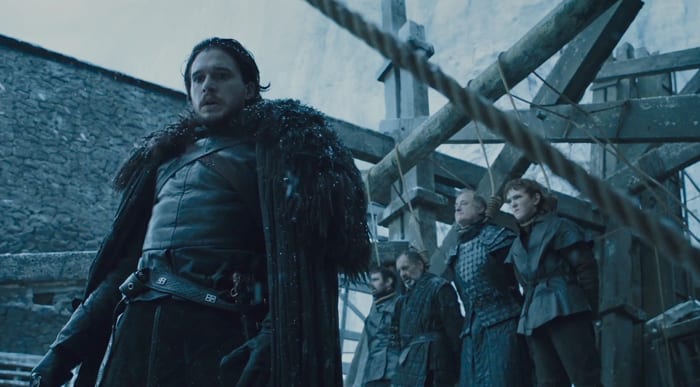
Well, it’s that, or he hung them and just decided to quit on the spot, which doesn’t make much more sense.
We also have to chat about the pre-resurrection shenanigans, because even on rewatch, we don’t get it. Why was there a fight over Jon’s body?
The best steelman we could come up with was that the Jonsicle lying on the table was incidental, and the real issue is that Davos, Edd, and the randos were friends with Jon, and Thorne therefore wants them dead. Because…they might tell someone? And they were Jon’s only friends despite him having just won an election with the popular vote? But this at least sort of works, because people fighting over some corpse just for fun is the opposite of logic. Another option is that this was all to protect Ghost, who was chilling by the corpse. Granted, none of this was explained or in any sort of evidence, and this was the ongoing tension for two full episodes.
However, the entire interlude with Thorne just felt like yet another time-filler. Especially since the Wildlings support for overthrowing Thorne was more or less a given. So it felt even more like D&D were just flailing around for an episode and a half until Edd’s off-screen adventure was a success. If they had to have killed Jon, which we’re not sure they did, then we see no reason why he couldn’t have been resurrected earlier.
That’s another issue: the idea of this resurrection being something Davos randomly thought of after the Thorne situation was handled. There’s no preface, there’s no one talking about the legend of Beric Dondarrian, and the one person who actually witnessed this power and potentially has the power herself isn’t the person who says it. Davos just thinks, “hey, a smoke baby was neat. She probably has other useful tools in her belt.”
Once this entire situation with Jon’s resurrection is resolved, anything to do with The Wall and the Night’s Watch effectively splats like a hot potato falling 700 feet to the ground. Even the scenes where Jon and Sansa eat soup only seem to be incidentally taking place at The Wall. Hell, the whole thing means so little, that the entire Lord Commandership is given to Edd as a punchline.
Did we mention that there were ice zombies coming? Any day now?

Really, this resurrection has neither a Watsonian nor Doylist rationality. The only reason we think it happened is because A Dance with Dragons closed with Jon being stabbed. And it’s not like the Checklist Effect is anything we aren’t used to at this point, but we’re talking about a major character’s death. At the least, could he have maybe, we don’t know, had a change in his palate? Maybe he eats the soup with his sister and comments on how things don’t really taste as strongly anymore. Anything?
Speaking of nothing, Jon’s resurrection is very tied up in Mel’s arc. Or rather, the scenes Mel is in this year. From what we can tell, D&D were trying to portray Mel’s loss of faith. And yeah, she fucked up epically and nothing went the way she thought last season. It totally makes sense that given the feedback of how bad she is at interpreting these visions of hers, she’d just want to take naked sad naps.
We’re still bemused why D&D opted to have Davos tell her to resurrect Jon rather than considering it herself, but being really generous…she’s so shaken she wouldn’t for a second think herself capable. Davos as the mouthpiece was just plot necessity. Edd could have suggested this to her too, and it would have made no difference.
What’s weird, though, is that even after successfully resurrecting Jon, Mel still spends all her time staring into the middle-distance and being sad. It’s only after they retake Winterhell and her vision from Season 5 comes true, that she gets a pep in her step again.
“I have seen myself walk along the battlements of Winterfell. I have seen the flayed man banners lowered to the ground.”
So okay…resurrection was no biggie, but learning that she can read the flames correctly is what her faith tied to? Maybe that’s supposed to be her specialty and junk.
But then all this means is her “arc” was being sad for a while, thinking her god sucked, and having a bit of an uplifting moment before being banished for something she really should have faced repercussions from sooner. Is this character growth? Is this her coming through her crisis of faith? What is this?
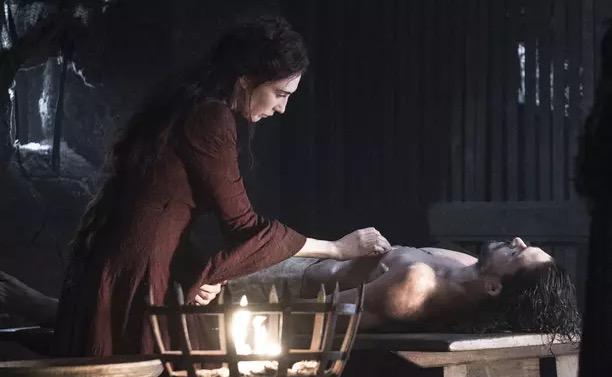
We can only ask the same question of Davos’s character journey this year as well. If anything, his is worse, because it’s all based on this contrivance that he doesn’t ask any questions about Stannis and Shireen until it’s plot-convenient for everyone else. He begins the season suddenly and inexplicably on Team Cardboard (to the point where this is the hill he’s willing to literally die on) for no other reason we can discern than that they are in the same physical location. Unless we’re supposed to think that he is so devoted to Stannis’s previous idea of bringing Wildlings into the realm to make them “citizens”?
The most generous we can be is to assume that he assumed Stannis died in the normal attacking-Winterhell-stupidly-when-you-don’t-have-enough-men kind of way, and that Shireen and Selyse were murdered in the aftermath. But given how prior to burning Shireen, Stannis still had a healthy number of men, even if depleted from the original size, and how all the snow suddenly and magically melted near Winterhell, you’d think that he would have maybe asked some follow-ups? Like, “Hey Mel, how did you survive when everyone else died?” Or “Hey Mel, why are you looking so damned disheveled right now? Did something happen that was out of the norm?”

But no, it was more important to guard Jonsicle, to randomly suggest resurrecting Jon (if he had Stannis’s corpse, would he advocated for resurrecting him?), and then spend all his time and energy trying to build a coalition for this man he barely knows. We are glad that they at least let him yell about Shireen’s death, because someone fucking should, but it was far too little too late to be even remotely effective.
Davos’s characterization was clearly not a priority for D&D this year. He was a convenient tool to use as the counterpoint in certain scenes, exactly like how they used him with Stannis. It’s just too bad he didn’t convince Lyanna Mormont by showing her his shortened fingers.
Jonny Snow was a Simple Fellow
However, while we could tell just how meaningless Jon’s death was even as the season was airing, one thing that wasn’t quite as starkly obvious as when we sat down for a straight rewatch was how stupid Jon is. Not just in a “haha this was a stupid thing he did here”; the man is a straight up fucking idiot. In fact, Kylie has a 7-minute song that can explain the depths of his incompetence, as well as his probable motivations.
Why did you do it, Jonny?
It’s not just one bad decision on the battlefield, either. From the second he sucked in that breath, Jonny was committed to doing exactly the dumbest thing possible in every moment. His plan after rage-quitting was literally, “get warm.” Get warm, when he fought in Hardhome and understands the stakes of the war to come. Get warm, when the Boltons control the North and there are no friendly faces around south of Castle Black. Get warm fucking how? Is he going to take a boat to Porne and become a bard or something?
Then his sister appears, who has been through hell and back, and who explains to him in very simple terms why they won’t survive anything unless they take back Winterhell. But Jonny is “tired of fighting,” so that gets tabled until Ramsay’s super mean letter arrives. For some reason, this convinces him to go fight.
Once he and Sansa begin trying to assemble their Coalition of the Willing, just about every decision Jon makes, and everything he asserts, is completely wrong. He can’t convince the Wildlings on his own to fight for him—that’s Tormund. For the second time in two seasons, we might remind you. Jonny fails to say anything effective to Lyanna—that’s Davos. Then Lord Glover throws him out on his ass.
For some ungodly reason, Jon gets terrified of potential flurries, and decides that it’s a really good idea to take his army that we know is only about a third the size of the Boltons’, and launch an attack right then. Even though they still haven’t checked with a bunch of Houses in the North, including the Manderlys, who were explicitly mentioned as having a fuckton of men. Even though they haven’t heard back from the person they sent to ally them with the Tullys.
Jon’s logic is “we fight with the army we have” and “battles have been won on worse odds.” But you know what battle was lost with these kind of odds? Stannis’s last season. Which was the exact same situation, though actually Stannis had far greater odds numbers-wise before barbecuing his own daughter.
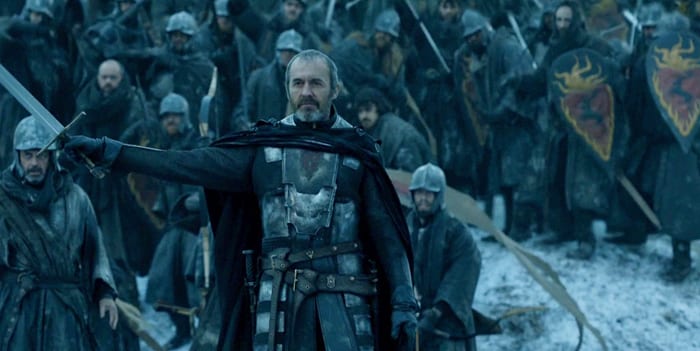
If the philosophy was that the Karstarks or Umbers would turn on Ramsay once the battle began, then alright, except Jon never said anything of the kind…only Sansa did. And he certainly never did anything to try and bring about that result.
And yes, we aren’t trying to be dismissive of a potentially disastrous storm. There is a legitimate risk in the weather changing, given how bad Northern storms can be. However, we refuse to believe that this potential for a bad storm was worse than the certain doom that must accompany attacking a superior force like that, on a field not of their choosing, with a lovely defensive stronghold that the Boltons could retreat into.
Again, we’re just two women foolish in the ways of war, but the situation seems rather hopeless. Not difficult, but hopeless. The only possible solution, and the only logical action, really, was to try and wait for more men. Yes, Sansa was horribly nonstrategic in her withholding of information about the Vale troops, but Jon knew of Brienne’s trip to Riverrun, and he certainly knew of the ravens he sent to the other Northern Houses. Not fighting in this case was a perfectly legitimate strategy. Neutral jing, buddy.
Also, it’s good to know Stannis had officially zero impact on the Boltons’ ranks. Did Ramsay lose any men after Battle 1.0?
But whatever, Jon was still determined to go to battle, and he was the designated commander. From the standpoint of the feudal order, this doesn’t make a ton of sense, unless we can say that he was the chosen commander by Sansa, the Lady of Winterhell, or something. Though even that’s thin, since Rickon was still alive prior to the Bastard Bowl and the Northern Lords knew it (Bran is certainly alive too, but we’re at least pretending Sansa and Jon are keeping that on the down-low).
The point is, Jon is just some dude who the Wildlings like, who represents House Stark thanks to being Ned’s son. ~Or is he??~
So all these people follow this guy as he face-plants into the worst military strategy we’ve ever seen. What’s incredibly weird is that there are scenes specifically to establish just how dumb every action he makes on the battlefield is. We hear him talk very smugly about how he won’t let Ramsay complete a pincer movement (or a double envelopment, or a charge from the sides), because of their trenches. Then we hear him tell Sansa that her advice of not falling into Ramsay’s traps is too obvious.

Then in the very same episode, we spend a full half hour watching him blunder his way into the traps he was warned of. His stupidly tiny army got caught in a pincer movement! He charged full on into the Boltons’ line because he fell for Ramsay goading him! There were no trenches! Even smaller things help paint a picture of total incompetence: we see Tormund shout out “don’t!”, and we see how Davos has to take over command, because Jon isn’t shouting a single thing. There’s actually no way you could randomly flip on this battle after the forces meet and come to the conclusion that Jon is the one leading it. Much less conclude that this is the guy worthy of accolades afterwards.
Everyone was killed. There were maybe like, a hundred dudes left, though the ones we recognized were all fine, of course. Then some other military force bailed them out— a military force that came out of nowhere and through no action of Jon’s.
This is just…the episode. We’re not exaggerating anything, and the people we’ve talked to who are not as foolish in the ways of war actually have told us that we’re underplaying just how inept this was. And yet, what happens in the end, but Jon is made King. Because he “avenged the Red Wedding.” WHAT? How was Ramsay involved in the Red Wedding? Or if the issue was the Boltons, then why were we treated to scenes of Lord Glover praising their liege lordliness, or the Karstarks and Umbers falling over themselves to sign up for Ramsay’s team?
There was absolutely nothing in Jon’s actions to recommend him as king. There was absolutely nothing in Jon’s station to recommend him as king. The only reason we can think of for this honor, especially when Sansa is sitting right there, starts with an “s” and ends with an “exism”, but that’s something for Part 3. And the only remote honeypot we can come up with is that the 10-year-old girl who proposed this is supposed to be…you know, a 10-year old girl with maybe not the world’s greatest ideas on the spot. We hate taking credit away from Lyanna, but it’s all we got.

Truthfully, even as the scene plays out, the decision to make Jon king came from nowhere. He mentions how there’s a war coming with ice zombies, and then Lyanna just pops up and starts talking about how great he is and how he’s got Ned Stark’s blood in his veins. It’s like D&D simply decided this needed to happen, so it did.
We think that the scene with Mel where Jon talks about how he couldn’t sit at the high table was supposed to evoke some kind of rags-to-riches success story for us. This is furthered with Benioff’s mystifying comment in the 6×10 Inside the Episode:
“At the same time it’s a pretty big reversal, you know, for a character who was dead at the beginning of the season to be declared king at the end of it…he’s done well. He’s done well in 10 short episodes.”
Yeah. That’s true. We’d even think that being dead at the beginning of the season and eating onion soup at the end would be doing pretty well, but hey, we’re easy to please.
There’s a bit of support for this “poetic justice” with Jon the bastard, since there was that one moment where Sansa tells the war council that she’s a Stark and people will rally to her, and Jon looks hurt. There’s also the awkwardness in the scene before he’s made king where he whines about his privilege to Mel (the former slave), and then he and Sansa duke it out over the Lord’s chambers. Or rather, Sansa seems disinterested and doesn’t really care, but Jon does stiffen when he talks about it.
So…is this enough to make his kingship meaningful? Or remotely justified? It’s taking a hot steaming shit all over the established rules of the universe, though D&D at least paid lip-service to it when Lyanna said, “I don’t care if he’s a bastard.” Maybe she doesn’t care, but why is everyone else cool with punting out the laws of succession?

Look, we know shoddy worldbuilding is the strongest theme of this show, especially this season, but that doesn’t exactly make this good writing. And it certainly doesn’t magically imbue Jon’s season arc with any sort of meaning. We’re all for the social mobility of bastards, but when it comes from an ass-pull to reward someone for being an idiot, what are we supposed to think of this?
Damn you Jonny, you paved the way for shallow writing to make its stay.
The Ballad of Ramsay Sue
Speaking of bastards and social mobility, Jon wasn’t the only one born on the wrong side of the blanket to have an improbable rise to power this season.
We’ve spoken before about how Ramsay is a Villain Sue, hence the nickname, and about how D&D have moved heaven and earth to make sure that we know just how much of an EVHUL and BADASS bad guy he is. Not to bring in too much dreaded book knowledge, but he is incredibly foregrounded from his role in the source material, where he is just some tertiary asshole. His biggest significance is in Theon’s arc, and he’s not meant to be taken as some kind of god-mode enemy. As the TV Tropes page on Villain Sue says:
“This character generally shows up as an author’s wish fulfillment to be evil…Either way, the same author favoritism and plot bias are now working for the forces of evil. It may also come about as an attempt to create a Magnificent Bastard or similar style of villain, only to go too far and become one of these.”
There’s nothing better to describe Ramsay’s ridiculous storyline last season. He and 20 men took out provisions for an entire army, he was illogically handed a bride to victimize, and even old ladies couldn’t have a private conversation in his castle without him knowing about it.
It’s safe to say that this season continued in the same pattern, to the point where, just like last season, there’s an entire storyline that is solely about Ramsay. Would that Davos or Mel had been that lucky.
He gets sequences dedicated to his daddy issues, his navigation of politics, and his relationship with his girlfriend. Then there’s scenes just to remind us again of how badass he is, like when we watched him peel an apple for half minute before D&D throw Osha to his mercy. Or when we have to see Walda be scared in a kennel as he says one liners for almost three minutes.
It’s made even worse when the fucking idiots Lord Karstark and Lord Umber love him so much that he can murder his father in front of them and have no consequences. Hell, Umber used that as his rationality for bringing him Rickon! He was just that impressed by his badass kinslaying.
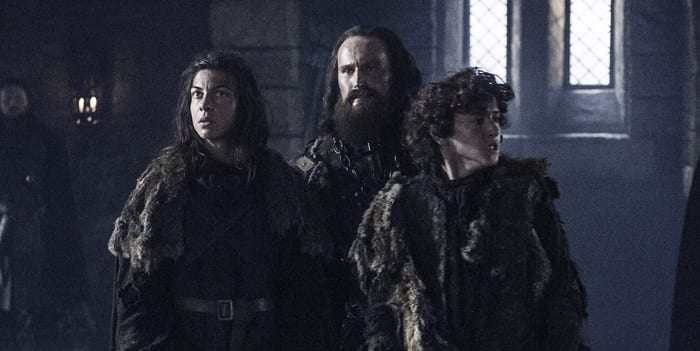
This was far, far worse in the early episodes than as the season went on, but much of our screentime was cannibalized by this random asshole. We get that he’s the primary antagonist, though we also do think it should have been asked at some point, “why is he the primary antagonist?” It’s sometimes said that writers should bring a five-year-old into the room with them to continually ask “why?”. That’d have been a good start here. Because so much of Ramsay’s Villain Sue-ness really has no justification outside of “we think this is cool.” We get it. He’s a schmuck. Genug.
The thing is, in D&D’s desperation to build Ramsay as the perfect enemy, they weren’t willing to let him have any losses. We think this was so that Jon’s victory would seem more improbable and dramatically satisfying, even though everyone with a working brain guessed what its outcome would be, including Sansa’s 11th-hour save.
But it just had this weird effect of painting Ramsay as this totally competent and often reasonable dude, who happened to be struck down with the random army of randomness. Yes, we understand a good Warden of the North should be watching Moat Cailin, but to pretend there was any Watsonian justification for the Vale Lords sneaking up the King’s Road is just an exercise in futility.
Taking everything into consideration, what strikes us is how Ramsay is both written and played with a nuance that the character just does not merit. Why did we need to have him murder Roose and Walda? Why was his place as his father’s heir even thrown into question? Would we not have thought him menacing otherwise? Why did Roose have to be removed from this equation at all, especially if the point of Jon’s victory was supposed to be to avenge the Red Wedding?
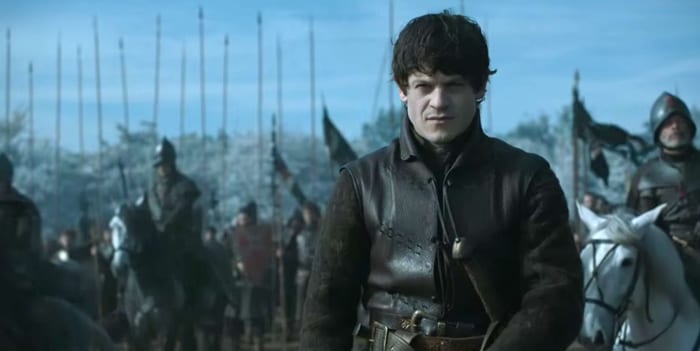
Foiled Foils
The thing is, we actually can answer these questions: they wanted the Designated Series Protagonist to face-off against the Designated Series Antagonist. In fact, we know from previous interviews that Ramsay has been viewed as sort of a “dark Jon,” with them both having been bastards in the North. There’s a video from Season 5 promotional material where George R.R. Martin himself discusses some of these parallels.
One little issue… When Martin talks about it, he’s saying it more to contrast the Starks and Boltons generally, and the specifics seem to be far more about Roose and Ned. Because a large point of the Northern theater, and the Red Wedding, is that the Boltons are markedly different rulers and liege lords than the Starks. Roose is cold, dispassionate, and calculating, and that carries over to his treatment of his son. This contrasts fabulously with Ned’s determination to give Jon his fair share of familial affection, in defiance of his self-interest, and even at the cost of his marriage. Similarly, Ned as a liege lord is known for being paternal, honorable, and available, though he does try and create some distance to his subjects.
Robb followed in suit, and met his own downfall trying to navigate competing obligations and honorable choices. Roose, who physically murdered Robb, did so in violation of his feudal obligations, and he secured the advancement of his House. Basically, the Boltons are usurpers, and the contrasting treatment of Ramsay and Jon fit into this larger picture.
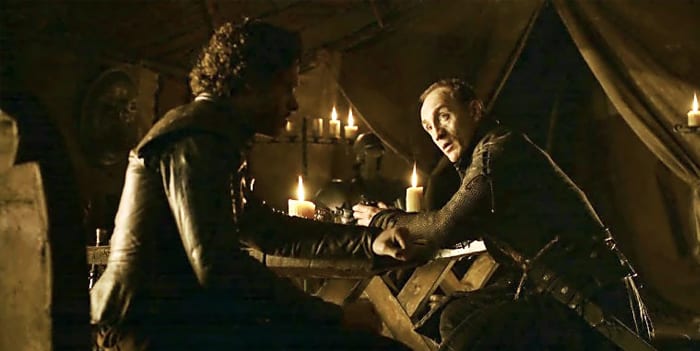
A Song of Ice and Fire is actually quite a romantic series, in a Byronic sense. For that reason, in the books (and we’re oh so sorry to bring this in), nature and the current political climate often reflect how you’re supposed to feel about the characters.
Under the Starks, the North was prosperous, rich, and considered so safe that a woman supposedly could walk down the King’s Road completely naked and be left alone. The Boltons, because they are usurpers, can only rule the ruins of the North, a North that’s devastated and disordered. And even when they attempt to do so, it’s rather clear that the North is teeming with resistance. The imagery of the Boltons being snowed in with the other Northern Lords, as their own men get picked off one at a time and tensions simmer to boiling, is fitting of how wrong the whole situation is. The weather is against them too.
We’re not saying that Jon and Ramsay can’t be the two primary actors in portraying this. It’s not the case in the books—Roose is most definitely more important than his son—but we at least understand that Ramsay is now a Bolton, and can very much be used as the symbol of everything we just described.
That being said, when we look at these two characters, any parallels between them strike us as rather superficial. Yes, they’re both bastards. They also both have canine friends. They’re of a similar age. Other than that, we’re kind of scratching our heads. The idea that Ramsay is a “dark Jon” suggests that there’s some possibility that Jon could be like Ramsay in a different set of circumstances. And sorry, we don’t buy that for one second.
What’s also more striking is that these two dudes don’t really know each other at all, nor do they mean much to each other. Ramsay has interacted and hurt Sansa closely. That is the Stark with whom he has a “relationship,” for lack of a better word. It’s natural that Jon is pissed that he hurt his sister, but to frame this as a conflict between them is troubling. Yes, it was decided that Ramsay is “Sansa’s kill” in the end, but the goddamn thing was named “The Battle of the Bastards.” So we feel it’s natural for us to presume that the central conflict was supposed to be between, you know, the bastards.
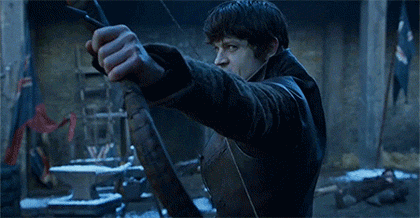
Similarly, it’s natural for Jon to be upset with the Boltons for the part they played in his brother’s death, but again, that had nothing to do with Ramsay in particular. In fact, Roose was the actor against Robb; Ramsay was busy in his torture-porn scenes with Theon.
So how is this showdown supposed to be meaningful? Unless it’s supposed to be about how Jon is destined to be King in the North somehow, and it’s pitting him against the guy usurping his seat or something… But even as we’re typing this, that makes no sense. Jon rejected Stannis immediately last season when the guy offered him to become Lord of Winterhell, and we’ve already discussed how his rise to kingship in this season was completely unearned. Are we supposed to assume the Northern Lords all saw the baby crossfade? Even so, that has jack and all to do with Jon’s claim in the North. Lyanna was younger than Ned. Sansa would still be the heir (assuming a dead Bran) and she’s sitting right there what are you doing?
Really, what it comes down to is that these two characters are only important to each other on a Doylist level: the marketing tells us Jon is our hero, and we’ve spent four full seasons having it drilled into our heads that Ramsay is maybe, just maybe a bad guy. But this is also the complete opposite way a story should be written. It’s like how Tyrion and Dany meeting was supposed to be this hugely momentous thing, so much so that Benioff specifically mentioned it had been a frustration for himself and Weiss, and yet all their first meeting consisted of was Emilia Clarke and Peter Dinklage lounging back in their chairs, a glazed look on their faces.

We also should add that watching this without weeks in between the episodes made the battle feel like it came very suddenly, and without much build-up. Logically we know this doesn’t make much sense, because there was an entire episode of them building their coalition, and several scenes of their battle planning. And yet, Episode 9 still took us by surprise at how quickly it came up. This isn’t helped by the fact that the justification for fighting this battle on the timeline they did doesn’t hold up under the smallest amount of scrutiny. Really, Stannis’s fight felt far more developed, even though that was the narrative equivalent of a rotten potato.
We’re a little confused why D&D didn’t simply have one battle for Winterhell, because anyone planning more than a season in advance would surely have seen how much of a rehash this is. We suppose it’s possible this is an adaptation of the wars to come in The Winds of Winter, but forgive us for being skeptical at this point. Especially given that Jon’s death was treated just as a minor inconvenience, and really played no role in anything. We just have a feeling that when we read the 6th book, things will look different.
Our point is, D&D’s attempts to make Jon and Ramsay convincing literary foils were not…good. They were unbelievably surface level. The only thing these two really had in common was that D&D liked putting them in situations where they could swing swords well.
The North Misremembers
However, the worst part of Ramsay Sue’s foregrounding and everything D&D did to make these improbable odds for the battle, is that the story they told about the Boltons and the Starks ended up proving the exact opposite point of what it was supposed to.
No matter what we think of D&D, we have to trust that they know the Boltons are the bad guys, and the Starks are the family we root for. Further, when Sansa killed Ramsay (don’t worry, much more on that later), their exchange was:
Ramsay: My hounds will never harm me.
Sansa: You haven’t fed them in seven days. You said it yourself.
Ramsay: They’re loyal beasts.
Sansa: They were. Now they’re starving.
We have to assume that this is an attempt at poetic justice. What goes around comes around, and just like Ramsay’s mistreated dogs turned on him in the end, the Boltons are incapable of inspiring loyalty.

Except, that’s not what happened at all. We’re not trying to pretend that Ramsay was this wonderful liege lord. Last season we learned that he flayed Lord Cerwyn for not paying enough taxes, and the Cerwyn son was more than happy to cough up the coins after that. So, this is troubling, and in our viewpoint, if we were Northern Lords, we’d be super distressed that the Boltons were in charge.
However, the Northern Lords this season didn’t share this view. We can excuse House Karstark pledging fealty, since they do have legitimate beef with how Robb handled Lord Karstark’s murder of the Lannister hostages. We mean, we still expected the new Lord Karstark to at least flinch when Ramsay murdered Roose, but we can just pretend that he’s really committed to this. Lord Umber is a different story, since it’s after he learns that Ramsay killed Roose that he comes to declare himself, and he cites the kinslaying as the reason why he is.
As for the rest of the Northern Lords, apart from Lyanna who has literally nothing to say about the Boltons (other than to accuse “Sandra” of being one), the only other one we hear from is Lord Glover, who praises the Boltons for retaking his castle from the Ironborn.
Aside from that one passing reference to Ramsay’s overly aggressive tax collecting policies last season, there’s no indication that the Boltons are doing a bad job running the North. They’re rebuilding Winterhell, which is incredibly symbolically important (in the source material, they’re pointedly living in the ruins, something Tumblr user @turtle-paced comments on here). They’re taking their feudal obligations seriously, and apparently this rulership is so effective that Ramsay can spend a season raping Ned Stark’s daughter and parade out Ned Stark’s son and cruelly murder him as a game, to no effect whatsoever.
Not to mention, the Northern Lords are supremely disinterested in helping Ned Stark’s children take back Winterhell. They just can’t be bothered, but they’re mad sorry in retrospect.
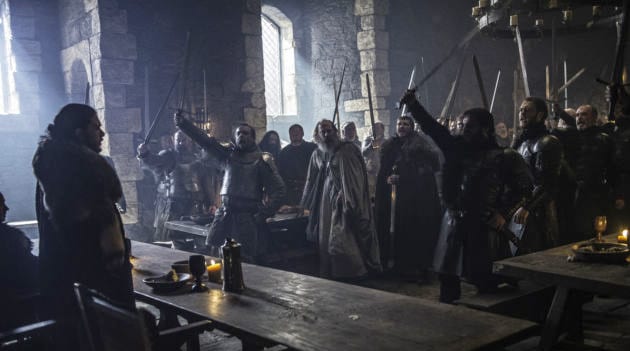
Really, we’re dumbfounded why the battle wasn’t used to showcase the idea that the Boltons inspire no loyalty, especially given the fact that it was mentioned both before the battle and after. Sansa was sure the North would rise for her and Jon. Jon taunted Ramsay before the battle by pointing out he wouldn’t fight for his own men by accepting the single-combat, and after the battle, we got the dog metaphor. But…nope. The two Northern Lords who were featured, Umber and Karstark, were loyal to the end, and in fact seemed to take particular pleasure in fighting against Jon and the Wildlings. Sansa’s assertion that the “North remembers” applied to officially one person, Lyanna, whose scene was meant to amuse the audience.
Jon, on the other hand, is terrible as a leader. The guy deserts the Night’s Watch with no justification given (which, in the books, is almost as bad as kinslaying to the Northern Lords); his only long-term goal was to selfishly “get warm” despite the army of the dead coming, and it’s his own hubris that led everyone to slaughter. The thing is, we’re told at the end of the episode, that it was Ramsay’s hubris that led to his slaughter. But…no! He led a perfectly competent battle, one in which he actually evoked Robb’s refusal to face Jaime in single combat. He just had the bad luck of a random army showing up and sweeping over everything.
We’ll get into this in Part 3 more heavily, too, but the random army that takes out the Boltons? Nothing to do with the North. Nothing to even do with the past two seasons. Sansa earned the good graces of the Vale Lords at the end of Season 4. It’s almost like she didn’t have to be in the North this whole time or something. For all Roose talked about her being the “key to the North,” we never saw any evidence that the Starks especially mattered here.
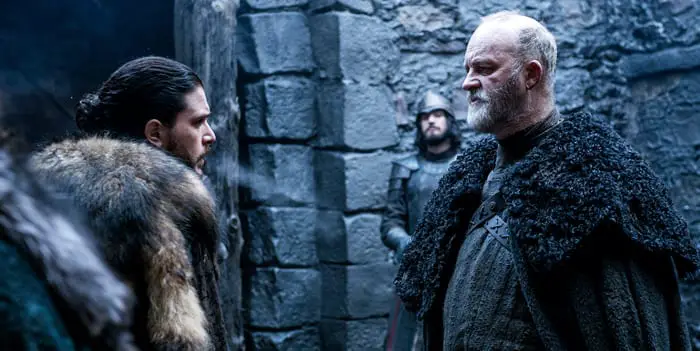
Look, we weren’t asking for a full-scale “Northern conspiracy” where people are hiding Robb’s will that legitimizes Jon, and every Northern Lord is working in perfect synchronization with each other. But we do at least want to feel like there’s a reason we’re rooting for the designated good guys. We get that this is a nihilistic show where everyone is equally terrible and terrible things happen that make us feel terrible. But for fuck’s sake, the comeuppance Ramsay got came out of left field. The only true takeaway we have about his character is that he should have been a more responsible dog owner.
What an Emmy-worthy tale.
Damn you, Snow
Like last year, we’re confused why anyone is compelled by Jon Snow as a character. He’s just a cut-out of an action hero, and this season’s main theme was how stupid he is. Why he was rewarded by the narrative over his sister is a very interesting question that we’re going to address in the next section. But until then, let’s raise our glasses to the passing of Ramsay Sue. We’re sure D&D won’t just build up Euron in the exact same way for Season 7.

Join Julie as she closes this out with a chat about Sansa.

